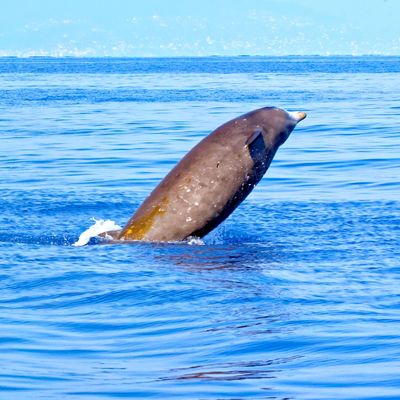
It feels fair to say that, for humanity, things are not going so well generally speaking. But for whales? Also not great, thanks, humanity! But for the Cuvier’s beaked whale, specifically? Well, I cannot speak for all of them, but what I can say is that they have reason to be proud. One Cuvier’s beaked whale has managed to shatter the record for longest deep dive by a marine mammal, holding its breath underwater for nearly four hours, which is really something. Gizmodo calls the achievement “mind-bending,” but I call it another example of cetacean excellence to add to the pile.
To be clear, Cuvier’s beaked whales are — as a rule — very good at holding their breath while they hunt deep-sea squid. In fact, their proficiency in this category earned Cuvier’s beaked whales the coveted number-ten spot on our comprehensive whale power ranking. But whereas the previous record-holder for long dives logged two hours and 17 minutes below the surface, a new champion (tagged ZcTag066) has now reset that bar twice.
In 2017, researchers with Duke University and the Cascadia Research Collective saw ZcTag066 execute two impressive dives: one that lasted nearly three hours, and another, a week later, that lasted just over three hours and 42 minutes. The scientists published their findings in the Journal of Experimental Biology on Wednesday. Ultimately, though, these two data points wound up excluded from their set, amassed over the course of five years with an eye toward ball-parking the Cuvier’s aerobic dive limits, because they followed “a known [one-hour] exposure to a Navy mid-frequency active sonar signal,” per Gizmodo. That exposure may have affected their typical foraging style.
But still, the dives happened, and I think that’s what’s important here. To quote Duke University Marine Laboratory animal behaviorist Nicola Quick, “These guys blow our expectations!” According to Gizmodo, the researchers approached their study expecting the whales would need to come up for air after about 33 minutes, a calculation they reportedly based on seals’ internal oxygen stores and diving limits. The median duration of the Cuvier’s beaked whales they tracked worked out to just under 78 minutes, so: Great job all around, whales, outstanding work per usual.





